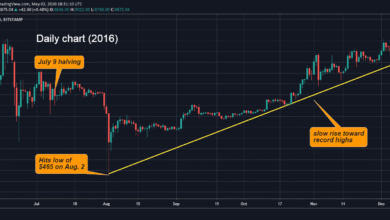Cryptocurrency Mortgage Policy: A Game Changer for Homeownership

In recent discussions on cryptocurrency mortgage policy, industry leader Cathie Wood of Ark Invest emphasizes the transformative potential of allowing digital assets to be used as mortgage collateral. This innovative approach could revolutionize homeownership for crypto investors, drastically changing the dynamics of real estate financing. With support from influential figures like William Pulte, who advocates for Fannie Mae and Freddie Mac to recognize cryptocurrency, the integration of crypto collateral could dismantle traditional barriers in acquiring home loans. Wood asserts that leveraging cryptocurrencies not only enhances access to housing but also serves to validate the financial standing of those invested in digital assets. As the crypto landscape evolves, the intersection of homeownership and crypto continues to gain traction, signifying a pivotal moment in mortgage policy reform.
The burgeoning concept of utilizing digital currencies as security for home loans is set to reshape the residential financing landscape. By recognizing cryptocurrencies like Bitcoin and Ethereum, lenders can innovate their mortgage offerings, accommodating borrowers who hold substantial crypto reserves. Influential voices in the finance sector suggest that this shift could simplify the path to property ownership, particularly for individuals whose wealth is primarily tied to digital assets. As the policy evolves, platforms designed for crypto collateral are becoming essential in bridging the gap between traditional mortgage systems and the rapidly expanding realm of digital trading. Ultimately, this progression underscores a broader acceptance of the significant role that blockchain-based assets are beginning to play in mainstream finance.
Understanding the Implications of Cryptocurrency Mortgage Policy
Cathie Wood’s perspective on the recent proposals regarding cryptocurrency mortgage policy highlights a pivotal shift in how digital assets are perceived within the real estate market. By suggesting that cryptocurrency could serve as collateral for mortgages, the directive from FHFA’s William Pulte is set to alter the dynamics of home financing. This recognition indicates a potential unification of the crypto world with traditional investing, paving the way for those who have significant investments in digital currencies to leverage their assets in securing home loans. Wood emphasizes that the implications extend far beyond just individual transactions; they could redefine access to homeownership for millions of crypto investors.
The integration of cryptocurrency within mortgage assessments also raises questions about regulatory frameworks and risk evaluation. Traditional financial institutions have historically excluded digital assets from collateral consideration due to their volatility and lack of liquidity. However, the FHFA’s new policy encourages Fannie Mae and Freddie Mac to embrace crypto collateral, potentially fostering greater acceptance of digital wealth. Improved risk assessments could lead to more tailored loan products, thereby enhancing the overall mortgage market. As Wood notes, “this could substantially enhance both cryptocurrency and housing markets,” indicating that the crossover of these sectors may be a market trend on the horizon.
Challenges and Critiques of Crypto-Focused Mortgage Initiatives
Despite the optimistic outlook from industry leaders like Cathie Wood, the new mortgage policy does not come without its challenges and criticisms. One significant concern highlighted by critics is the directive’s requirement for digital assets to be held on centralized exchanges. This condition seems at odds with the decentralized nature of cryptocurrencies. Many Bitcoin holders and advocates criticize the policy for reinforcing traditional banking structures that contradict the core principles of crypto ownership and use. The necessity to convert assets into a centralized form may deter potential homeowners who strongly value independence and decentralization in their financial practices.
Furthermore, the volatility associated with cryptocurrencies presents another layer of complexity. While Wood argues that recognizing digital assets can enhance homeownership options for crypto holders, the reality remains that fluctuations in asset value could create uncertainty in mortgage borrowing. The proposal to adopt volatility discounts signifies awareness of this risk; however, it raises questions about how effectively these measures can be implemented in a dynamic market. Such inherent risks might make lenders cautious, potentially leading to restrictive lending practices. Hence, while the new policy symbolizes progress, the established frameworks of Fannie Mae and Freddie Mac may need to adapt significantly to navigate the interplay between crypto assets and home financing.
Cathie Wood’s Vision for Homeownership in the Crypto Era
Cathie Wood’s vision for integrating cryptocurrency into the homeownership landscape reflects the potential for significant financial innovation. She believes that allowing digital assets to count as collateral can unlock new avenues for individuals who are currently excluded from homeownership due to traditional lending practices. This perspective underscores a critical transformation in the housing market, as it signifies recognition of crypto holders as viable mortgage candidates. Moreover, the acceptance of cryptocurrencies could encourage more investors to enter the real estate market, potentially driving property values and stimulating economic growth.
In articulating her views on homeownership and crypto, Wood highlights an essential aspect of the evolving financial ecosystem. For many individuals, considerable wealth is tied up in digital currencies, which have historically limited their ability to secure conventional mortgages. By allowing these assets to be utilized in financing, the market may see a shift in demographic trends, where younger, tech-savvy investors become the new homeowners. Wood’s proactive stance addresses the critical need for financial institutions to adapt to the changing landscape of wealth management and ownership, suggesting a future where digital assets are seamlessly integrated into financial products.
The Role of Cryptocurrency in Enhancing Home Financing Options
The implementation of cryptocurrency mortgage policies, as proposed by Cathie Wood and William Pulte, may revolutionize the home financing options available to prospective buyers. The concept of using digital assets like Bitcoin or Ethereum as collateral reshapes the conversation around homeownership, particularly for millennials and Gen Z, who are more likely to hold significant portions of their wealth in cryptocurrencies. This new paradigm could lead to a more inclusive mortgage market that acknowledges diverse asset portfolios. For young investors in particular, this policy could eliminate barriers that have long hindered access to property ownership, offering a viable pathway to realizing the dream of homeownership.
Furthermore, as more financial institutions begin to recognize the importance and value of digital currencies, the resulting competition could lead to better mortgage products and rates tailored to crypto holders. The flexibility offered by recognizing crypto collateral means that borrowers may have access to lower down payments, which is especially compelling given the current high property prices. Homeowners could leverage their investments in cryptocurrency without the pressure to liquidate their assets, thus allowing them to maintain their financial strategies while pursuing real estate investments. As Wood suggests, this intersection of crypto and home financing can significantly enhance access to affordable housing and empower a new generation of buyers.
Cryptocurrency’s Influence on the Future of Real Estate Investments
With the integration of cryptocurrency into mortgage financing, the entire landscape of real estate investments stands to be transformed. As industry leaders like Cathie Wood advocate for recognizing digital assets in mortgage policies, investors are beginning to re-evaluate how they approach real estate. The potential for cryptocurrencies to be used as collateral will pave the way for innovative investment strategies. Investors can diversify their portfolios further by leveraging both traditional and digital assets, demonstrating a shift towards more complex asset management. This change could reshape how individuals view the value of their investments and promote a more robust real estate market.
The implications of cryptocurrency influencing real estate do not simply end with mortgage policy changes. As more individuals gain access to home loans through digital asset collateral, we may also see a significant uptick in property transactions involving crypto payments. This trend could lead to a rise in real estate transactions performed entirely in digital assets, catering to a new breed of investor. As acceptance grows, developers and sellers may find themselves adapting to this new form of payment, creating a robust intersection between the crypto and real estate markets—an evolution that Cathie Wood believes could greatly enhance both sectors.
Reducing Barriers to Homeownership for Crypto Investors
The proposed mortgage policies by Fannie Mae and Freddie Mac are critical steps toward reducing historical barriers that crypto investors face in achieving homeownership. Cathie Wood highlights how these regulations will significantly enhance access to sustainable homeownership for individuals who have primarily relied on digital assets. Traditionally, conventional lenders have been skeptical of offering mortgages to individuals whose wealth is largely concentrated in volatile cryptocurrencies, often isolating them from financing opportunities altogether. By valuing crypto holdings as legitimate assets, the path to homeownership can become more accessible, facilitating a more diverse demographic of homebuyers.
As homeowners can now use their cryptocurrency as a form of collateral without needing to liquidate it, this policy opens new avenues for capitalizing on their investments while fostering financial responsibility. This shift could particularly benefit first-time buyers and those from non-traditional backgrounds who have previously struggled to meet the rigid requirements of conventional mortgages. Wood’s advocacy reinforces the growing belief that owning real estate should not be limited by one’s asset composition but rather celebrated as a critical step toward wealth accumulation and stability in one’s financial journey.
The Intersection of Traditional Lending and Crypto Finance
The intersection of traditional lending mechanisms and the emerging world of crypto finance presents unique opportunities and challenges. The directive to include cryptocurrency holdings in loan evaluations by Fannie Mae and Freddie Mac signals a significant cultural shift within the financial industry. This acknowledgment of digital assets could lead to a different understanding of borrower qualifications, moving away from traditional asset forms like cash and stocks to also include crypto collateral. As the public becomes increasingly familiar with cryptocurrencies, banks and mortgage lenders must adapt their models to accommodate these new forms of wealth.
Yet, this intersection invites scrutiny regarding risk management and regulatory compliance. While embracing cryptocurrency in lending processes provides opportunities for innovative solutions, it also requires rigorous frameworks to address the inherent volatility and regulatory challenges associated with digital currencies. Financial institutions must craft robust policies ensuring compliance while safeguarding their interests in potentially unpredictable markets. Engaging with regulations set forth by authorities such as the FHFA will be critical to facilitate this evolution safely and effectively, ensuring that both traditional investors and crypto holders can benefit from these new arrangements.
Navigating Volatility in Cryptocurrency Mortgage Collateral
One of the most pressing concerns surrounding the use of cryptocurrency as collateral in mortgage applications is the inherent volatility of digital assets. Unlike traditional financial instruments, cryptocurrencies can experience significant price swings in short periods. This volatility raises questions about the effectiveness of using crypto as a stable form of collateral. While the FHFA has proposed mechanisms such as volatility discounts, the question remains whether these measures are adequate to protect lenders and borrowers alike from rapid market changes. Cathie Wood argues that these challenges must be thoughtfully addressed to foster greater confidence in the use of cryptocurrencies in home financing.
The economic implications of volatility suggest that both borrowers and lenders may need to adopt a more proactive approach to risk management. Financial institutions must implement comprehensive strategies that incorporate risk assessment models specific to cryptocurrency while educating borrowers on the potential risks involved with leveraging their digital assets. Investors may also want to diversify their holdings or partake in strategic asset allocation to mitigate the effects of fluctuating market conditions on their mortgage eligibility. Navigating these challenges will require a collaborative effort between regulators, lenders, and borrowers to ensure that the potential of cryptocurrency mortgage collateral can be fully realized.
The Future of Homeownership: Cryptocurrency and Financial Inclusion
As we look to the future, the intersection of cryptocurrency and homeownership reflects broader trends toward financial inclusion and innovation within the economy. Cathie Wood’s advocacy for accommodating digital assets in traditional mortgage structures highlights the demand for more inclusive practices catering to a growing demographic of tech-savvy investors. The acknowledgment of cryptocurrencies by institutions like Fannie Mae and Freddie Mac represents a shift toward recognizing the diverse financial landscapes that potential homebuyers inhabit. This evolution could pave the way for a significant expansion of the homeownership market, offering opportunities to individuals who have historically encountered barriers due to their asset forms.
Moreover, enhancing access to homeownership through crypto assets can fundamentally alter societal perspectives on wealth and success. By validating the use of digital currencies in purchasing real estate, financial institutions can contribute to dismantling persistent inequalities in access to housing and capital. As the housing market adapts to these changes, we may witness a paradigm shift where diverse asset ownership is celebrated rather than viewed with skepticism. Ultimately, bridging the gap between cryptocurrency and homeownership could lead to increased economic empowerment and stability for a new generation of homeowners, as advocated by figures like Cathie Wood.
Frequently Asked Questions
What is cryptocurrency mortgage policy and how does it impact homeownership?
Cryptocurrency mortgage policy refers to regulations that allow digital assets, like Bitcoin, to be used as collateral when applying for a mortgage. This innovative approach enables those invested heavily in cryptocurrencies to secure homeownership without liquidating their assets. With the recent proposal from government-sponsored enterprises like Fannie Mae and Freddie Mac to recognize crypto as valid assets in their risk assessments, borrowers can potentially utilize their digital currency holdings to qualify for loans, enhancing access to sustainable homeownership.
How does Cathie Wood view the connection between cryptocurrency and real estate?
Cathie Wood, CEO of Ark Invest, believes that integrating cryptocurrency into mortgage policy could revolutionize the housing market. She emphasizes that this shift could address significant barriers faced by crypto investors in obtaining mortgages. By allowing cryptocurrencies to serve as collateral, the policy can facilitate homeownership for those previously sidelined by traditional financing criteria, signifying a major step towards inclusivity in the financial landscape.
Why are Fannie Mae and Freddie Mac important in the cryptocurrency mortgage policy discussion?
Fannie Mae and Freddie Mac play a crucial role in the cryptocurrency mortgage policy landscape as they are key government-sponsored enterprises that influence the mortgage market. Their recent directive to assess cryptocurrency as a legitimate asset for mortgage qualifications means that homebuyers can leverage digital assets without needing to convert them into traditional currency. This policy shift marks a pivotal moment in transforming how digital assets are viewed in the context of home financing, potentially reshaping the pathway to homeownership.
What concerns do crypto investors have regarding the new mortgage collateral policy?
Some crypto investors have raised concerns about the new mortgage policy, particularly the requirement for cryptocurrencies to be held on centralized exchanges like Coinbase. This stipulation contradicts the decentralized ethos of cryptocurrencies and may alienate many Bitcoin holders who value control over their assets. Critics argue that limiting collateral to centralized holdings undermines the foundational principles of blockchain technology and could hinder broader adoption among those wary of centralized financial systems.
How does the digital assets mortgage policy impact risk assessment for mortgage loans?
The digital assets mortgage policy aims to enhance the accuracy of risk assessments for mortgage loans by incorporating cryptocurrencies into the evaluation process. By recognizing digital assets held on regulated exchanges as part of borrower reserves, lenders can more effectively assess borrowers’ financial stability without requiring asset liquidation. This could lead to fairer lending practices and broader access to mortgage financing, particularly for borrowers who predominantly hold their wealth in cryptocurrencies.
What implications does Cathie Wood suggest the crypto collateral policy has for the housing market?
Cathie Wood suggests that the crypto collateral policy could significantly disrupt the housing market by expanding access to homeownership for cryptocurrency investors. By allowing them to use digital assets as collateral for mortgages, the policy may unlock opportunities for a demographic previously excluded from traditional financing avenues. Wood believes that this innovative approach could lead to increased participation in the housing market, ultimately benefiting both the cryptocurrency and real estate sectors.
Can digital asset holders now qualify for a mortgage without liquidating their cryptocurrency?
Yes, under the new cryptocurrency mortgage policy, digital asset holders can qualify for a mortgage without the need to liquidate their cryptocurrencies. The guideline allows borrowers to utilize their cryptocurrency holdings as collateral during the mortgage application process, which could significantly simplify and expedite securing home financing for those with significant investments in digital assets.
What role do William Pulte and the FHFA play in the cryptocurrency mortgage policy?
William Pulte, as the director of the U.S. Federal Housing Finance Agency (FHFA), is instrumental in advancing the cryptocurrency mortgage policy. His directive mandates that Fannie Mae and Freddie Mac prepare to acknowledge cryptocurrencies as valid assets during mortgage assessments, facilitating the integration of digital assets into traditional lending practices. Pulte’s efforts reflect a progressive shift in recognizing the value of cryptocurrencies within the housing finance sector.
What are the long-term effects of integrating cryptocurrencies into mortgage policies?
Integrating cryptocurrencies into mortgage policies could lead to significant long-term effects, including increased financial inclusion for investors with non-traditional asset portfolios and a redefined landscape of lending practices. As the market adapts to the recognition of digital assets, we may see more flexible mortgage options, innovations in risk assessment, and an overall push towards modernizing financial systems to embrace new technologies, ultimately benefiting both borrowers and lenders.
| Key Points | Details |
|---|---|
| Proposed Policy Change | Fannie Mae and Freddie Mac will accept cryptocurrency as collateral for mortgage loans. |
| Influence on Homeownership | This could enable crypto investors to access mortgages, overcoming barriers caused by non-traditional assets. |
| Impact on Lending Regulations | Marking a significant regulatory shift, aiding financial inclusion for digital asset holders by improving their mortgage qualification prospects. |
| Concerns from the Crypto Community | Critics argue that requiring crypto to be held on centralized exchanges contradicts the decentralized nature of cryptocurrencies. |
| Market Response | Cathie Wood emphasizes the potential positive disruption of home and crypto markets, while acknowledging the skepticism surrounding the policy. |
Summary
The cryptocurrency mortgage policy has the potential to transform homeownership for digital asset holders. With Fannie Mae and Freddie Mac preparing to recognize crypto as valid collateral for mortgage loans, this policy removes significant barriers that have previously hindered investors in cryptocurrency from accessing home financing. Despite some concerns regarding centralized exchanges and the implications for crypto’s decentralized ethos, the directive represents progress towards financial inclusion, allowing more investors to leverage their digital wealth for homeownership.




